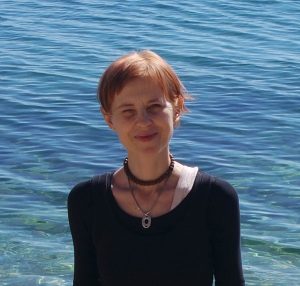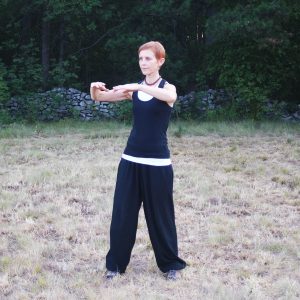Smiljana Golja – interview with a Qi Gong woman
I am passionate about Taijiquan and Qi Gong. And I am a woman. And I think that women are a bit underrepresented in the Tai Chi and Qi Gong world. I mean, look at all the big masters, they are mainly men! So I want to raise the awareness for all the wonderful women in our community. Thus I often interview Tai Chi and Qi Gong women. In this interview I talk to Smiljana Golja who blog with her partner at PetarSmiljana Qigong.
Tell us a bit about yourself.
Hi, I’m Smiljana Golja and I currently live in Slovenia, near the border with Italy, in the area called Kras. I’m an enthusiastic practitioner, explorer and teacher of Qigong and a Biodynamic Craniosacral therapist. I love nature and I love fun.
What I was always looking for was the understanding and experience of a deep interconnection between human, nature and universe. This interest lead me to Craniosacral therapy first and then to Qigong, Taijiquan and Daoist Nei Gong.
All these fields offer me the possibility to study and explore different but tightly connected realms of our existence – body, mind, energy and spirit. The Daoist world view contains ancient knowledge about universal wisdom which nowadays a modern science is trying to explain with a help of quantum theory, unified field theory…
I appreciate that I can share all these interests and practices with my partner Petar. From the desire to share our experience and knowledge with more people we have started to write blogs and make videos about Qigong.
Please share some details of your Taijiquan/Qi Gong journey?
Before my Qigong journey has begun I was practicing for many years Ki-Aikido. Through years my interest for human anatomy, body-mind work, herbalism and natural healing methods, especially those connected with energy work, was growing.
I was looking for a school of Shiatsu but instead I’ve discovered a school of Craniosacral
therapy. Never heard about… but my instinct was telling me that I had to go. A completely new world has opened to me; world of human body and energy felt through subtle rhythms of craniosacral biodynamics. But not only that.
Our teacher practiced and taught Qigong and Taijiquan as well. He recommended to us a Qigong practice as one of the best ways for healer’s self-care. It helps you to maintain harmony of your physical body, develop calm and focused mind, become more sensitive for energy, keep your energetic field strong and clear, raise your awareness… All these things are important for Craniosacral therapist.
Since the day I’ve started with Qigong I’m practically doing it every day. Only the program, length and intensity are changing and increasing in accordance with developed skills and the level of my understanding and experience.
At that time I couldn’t even imagine that I will teach Qigong one day. Among other things Qigong helped me to change myself so much that I became able to break with my “conventional” way of life, step out of the “square” and start doing things that I really love to do.
I love to teach Qigong to people and give them a wonderful tool which can be used to bring harmony in all levels of their existence.
Finish this sentence: When I started learning Taijiquan and/or Qi Gong, I would have liked to know…
…a lot of things – my answer would be a long time ago. But today I’m aware that each piece of knowledge came just in the right moment. Every moment without clarity gave me an opportunity to better know myself, develop patience and perseverance or to empty my full cup and become ready for more or ask the right questions…
But a small hint for readers… Try to feel more and think less. Don’t think and rationalize too much. It makes you mentally and physically tense and Qi can’t flow.
I’ve got this advice but I wasn’t able to hear it. As a beginner I was stuck some time because I was trying really hard to intellectually understand things. Or do things forcefully. The understanding of Daoist Wu Wei principle – not forcing things – has come later…
I recommend you to apply this wisdom first during the practice, and later more and more often in your life.
Is there anything that you have specifically learnt from your first teacher that you still remember? A lesson or insight that you keep dear to your heart?
What it means to live Qigong was one of the many precious lessons that my first teacher gave to me. He taught me this through his example. I think he used (and still does) every spare moment in his intense schedule between therapies, teaching and family life, to study or practice Qigong, Taijiquan, Eastern philosophy… You could see him during the pauses for example in some corner practicing movements. I’ve learned from him that you can practice posture, movements, breathing always and everywhere in your daily life little by little. Until they become a part of you.
He liked to say “Everything is Qigong…” and he smiled. Yes, this ancient wisdom and skills are meant to be used in our way of living, interacting with others and nature.
What are you currently practicing? Do you have any personal goals in Taijiquan and/or Qi Gong?
I always try to keep balance between Yin and Yang practice. I practice stationary and moving Qigong, Taijiquan, standing and sitting Qigong meditation, Nei Gong. Currently I try to spend more time studying and practicing Nei Gong, Flying Phoenix Qigong Meditations and Taijiquan. The part of my regular routine is always spinal Qigong, and of course warm up and stretching. I practice alternately also Qigong sets that we teach, for review and deeper understanding. For example Five elements, Eight Pieces of Brocade, Five animals, Taiji Qigong.
With Petar we have many projects in mind which regards Qigong teaching material in different forms.
How does your Taijiquan and/or Qi Gong practice impact your everyday life?
Morning Qigong training is time when me and my partner Petar practice together. We balance each other and our relationship. Beautiful impact…
As I have already mentioned I try to use the knowledge and principles of Qigong, Nei Gong, Taijiquan everywhere in my life. In relationships with people, when looking for solutions, doing chores, … I’ve used them to create a lifestyle which is more in a harmony with nature and it enables me to stay in touch with myself.
The results are good mood, strong health, a lot of energy and creativity, emotional stability. I’m able to feel deep stillness inside me. I feel connected with this world and everything beyond.
I think that it is best to learn from a teacher in person, but which book taught you the most? Which would you recommend to a friend?
This is really a tricky question because we are so different.
If one is interested in the basic concepts of Qigong I would recommend the book which was my theoretical introduction in Qigong: The Root of Chinese Qigong by Dr. Jwing-Ming Yang*. I think it’s still excellent to get your “roots”.
But if one wants to learn a Qigong set, without previous practical knowledge, using only a book she/he will be in trouble. Luckily, nowadays there are many books accompanied by video courses which make learning much easier. To start you have to know what is your goal and find the right style of Qigong and teacher/author that you like.
Now if you, dear reader, would like to know more about Smiljana Golja and her Qi Gong, have a look at petarsmi.com/en/blog/ or visit their YouTube channel.
Happy Qi!
Angelika
